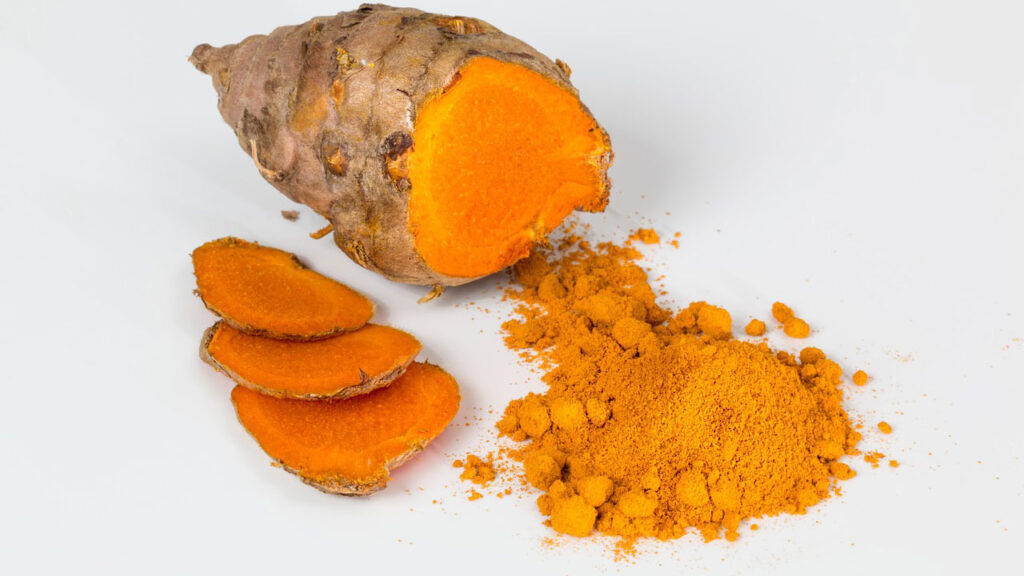Will Turmeric Help With Sleep?
Summarize

Turmeric, a vibrant yellow spice, has been a staple in culinary and medicinal practices for centuries, particularly in Asian cultures. Its potential health benefits have recently gained attention in Western medicine, especially regarding sleep improvement. This article investigates the connection between turmeric and sleep, exploring how this ancient spice might enhance sleep quality.
What Is Turmeric?
Turmeric, known scientifically as Curcuma longa, is a root belonging to the ginger family. It’s renowned for its compound curcumin, which imparts a distinctive yellow color and is responsible for many health benefits. Historically, turmeric has been a significant element in Ayurvedic medicine, symbolizing purity and healing.

What Does Turmeric Do?
Turmeric is known for its antioxidant properties. These properties make turmeric potentially beneficial to reduce pain, improve memory, and lower the risk of heart disease. The study shows that the main ingredient in turmeric, curcumin, might fight some health conditions, thus benefiting the body and brain.
Can Turmeric Help Sleep?
Recent studies suggest a potential link between turmeric and improved sleep quality. The studies found curcumin may affect neurotransmitter function within the brain, potentially influencing mood and stress relief factors. This interaction with brain chemistry might help stabilize mood swings and reduce stress levels, both of which are beneficial for a healthy sleep cycle.
While these potential effects are promising, turmeric or curcumin should not be solely relied upon as a primary treatment for sleep disorders. It can include regular exercise, a balanced diet, and good sleep hygiene practices.
Turmeric and Stress Reduction
Chronic stress is a common sleep disruptor. Turmeric’s potential in reducing stress and anxiety, primarily through its anti-inflammatory effects, may indirectly contribute to better sleep. By lowering stress levels, it helps in creating a conducive environment for restful sleep.
Other Best Supplements For A Sound Sleep
Beyond turmeric, other supplements can be used for their potential to enhance sleep quality. Among the most popular is melatonin, a naturally occurring hormone that regulates the sleep-wake cycle. Supplemental melatonin can be particularly beneficial for individuals experiencing sleep disturbances, such as those with jet lag or shift work disorder. It helps recalibrate the body’s internal clock, aiding sleep onset.
Magnesium is vital in numerous bodily functions, including sleep regulation. Magnesium helps to calm the nervous system, preparing the body for restful sleep by promoting relaxation. It’s beneficial for those who struggle with insomnia or restless leg syndrome. The manufacturers produce supplements with magnesium in various forms, including oral and topical applications like magnesium oil. In addition to supplements, eating magnesium-rich foods like leafy greens, seeds, and nuts can be beneficial.
Valerian root is another herbal supplement used for centuries to promote relaxation and improve sleep. Many people find valerian root effective in reducing the time it takes to fall asleep and improving the overall quality of sleep. This supplement is available in various forms, including capsules, teas, and tinctures.
As with any supplement, remember to consult with a healthcare provider before incorporating these supplements into a sleep improvement strategy. Besides, each person’s response to supplements can vary, so it may take some experimentation to find the combination that works best for individual needs.
How to Add Turmeric to Your Daily Routine?
Adding turmeric to your daily routine is easy and beneficial. Remember that turmeric is potent and has a strong flavor, so start with small quantities and increase as per your taste preference.
Here are some practical ways to add turmeric to your diet:
1. Cooking with Turmeric
Turmeric is a staple in many cuisines, particularly in Indian cooking. You can easily add it to curries, stews, soups, and rice dishes. Just a pinch of turmeric can enhance the flavor and nutritional value of your meals. Remember, a little goes a long way, so start with small amounts.
2. Turmeric Tea or Golden Milk
Turmeric tea, also known as golden milk, is a popular way to enjoy the benefits of turmeric. To make it, warm up your choice of milk and stir in a teaspoon of ground turmeric, black pepper (to enhance absorption), and a sweetener like honey or maple syrup. Adding other spices like cinnamon or ginger will give it additional flavor.
3. Smoothies and Juices
Adding a small amount of turmeric to your smoothies or juices is an effortless way to incorporate it into your diet. Turmeric pairs well with fruits like mango and pineapple and other vegetables like carrots and kale.
4. Turmeric Supplements
If you prefer a more straightforward approach, turmeric supplements are available in capsule form. This is a convenient option if you’re looking to consume turmeric regularly and in a more controlled dosage.

5. Seasoning for Vegetables and Meats
Turmeric can be used as a seasoning for both vegetables and meats. Sprinkle some ground turmeric on your veggies before roasting, or rub it onto chicken, fish, or meat before cooking. It adds a warm, earthy flavor and a golden color to your dishes.
6. Turmeric in Salad Dressings
You can make a simple and healthy salad dressing with turmeric. Mix olive oil, lemon juice, a bit of turmeric, and a hint of black pepper. The dressing goes well with salads and adds a flavorful and healthy twist.
7. Turmeric in Baking
For those who enjoy baking, turmeric can be a unique addition to baked goods like bread, cakes, and cookies. It imparts a subtle flavor and a beautiful color, making your baked treats not only delicious but also visually appealing.
Conclusion
While the direct research linking turmeric to improved sleep is still developing, the existing studies and known properties suggest a positive influence on factors that can enhance sleep quality. The active compound in turmeric, curcumin, with its potential to alleviate pain, reduce anxiety, and interact with key neurotransmitters, may indirectly contribute to better sleep patterns and overall nighttime rest. Future research may further illuminate the role of turmeric in sleep health, offering more profound insights into how this spice can be effectively applied in modern wellness routines.
Sources
- Hewlings, S. J., & Kalman, D. S. (2017). “Curcumin: A Review of Its’ Effects on Human Health.” Journal of Medicinal Food.
- Mazzoccoli, G., Notarangelo, F. D., De Cata, A., Piepoli, A., & Vinciguerra, M. (2021). “The Timing of the Circadian Clock and Sleep Differ between Nociceptive and Neuropathic Pain.” PLOS ONE.
- Dowling, G. A., Burr, R. L., Van Someren, E. J., Hubbard, E. M., Luxenberg, J. S., Mastick, J., & Cooper, B. A. (2022). “Melatonin and Bright-Light Treatment for Rest-Activity Disruption in Institutionalized Patients with Alzheimer’s Disease.” Journal of the American Geriatrics Society.
- Winkler, A., & Ghosh, S. (2022). “Curcumin: The Golden Nutraceutical: Multitargeting for Multiple Chronic Diseases.” Preprints.
Share this post
